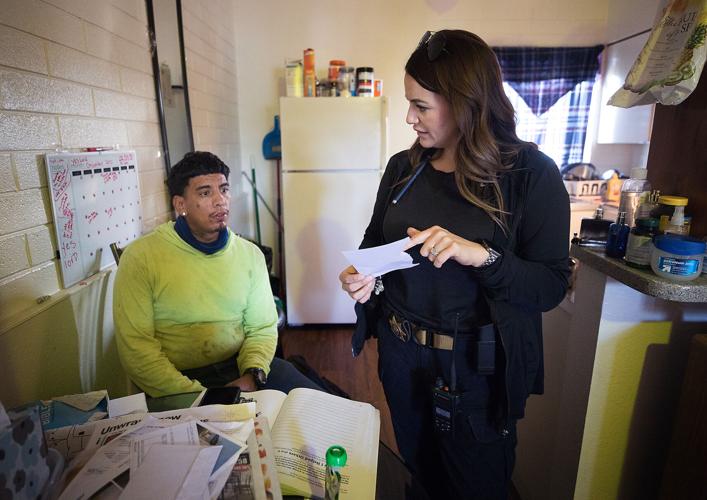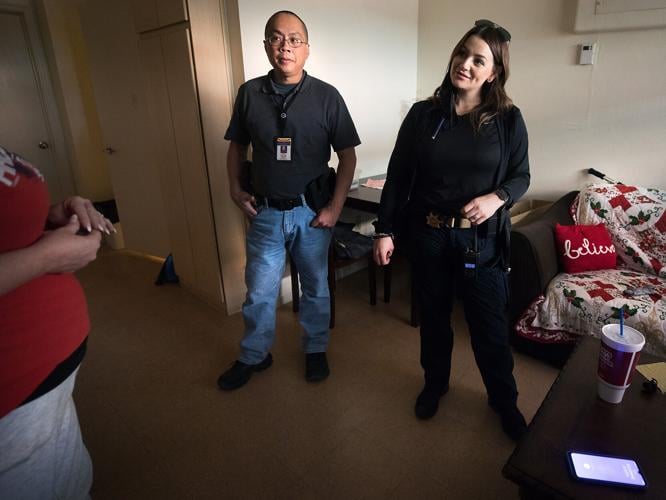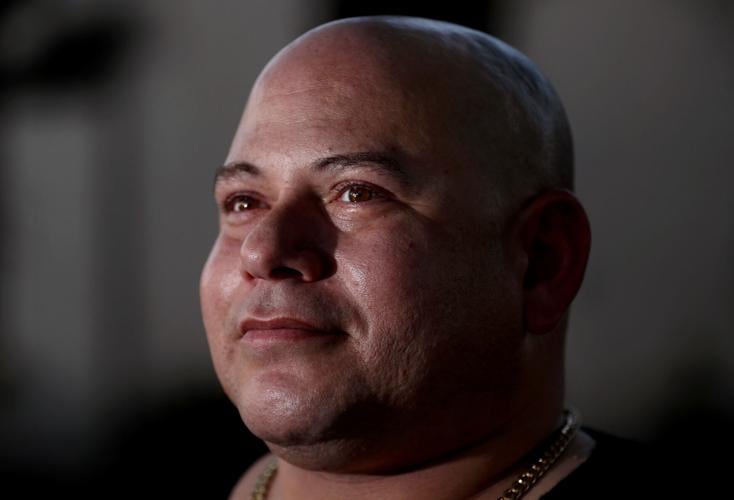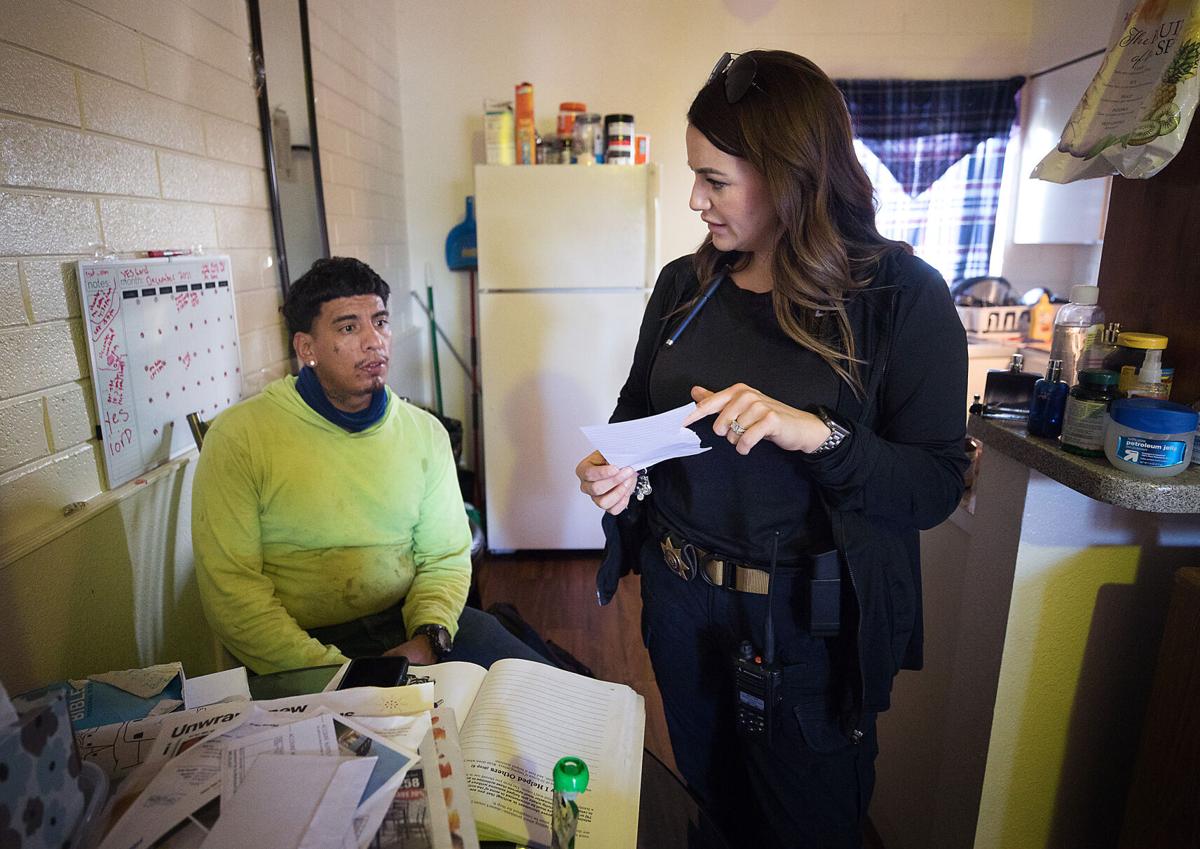Two years ago, just before the pandemic touched down in Tucson, David Sumegi felt he was out of options. “I was going nowhere fast,” he says.
Now 46, he had been kicked out of his home at 18, after coming out to his family as gay, sending him on a downhill slope. “Pretty much right after that was when I started using,” he said. “It really just ruined my life.”
His addiction to methamphetamine landed him in prison a handful of times, and by the time 2020 rolled around, he’d lost hope.
“The next step was probably death,” Sumegi said. “Then I picked up a possession charge, which would have meant going back to prison again, but I was offered the (Drug Treatment Alternative to Prison) program.”
DTAP, which is entering its 11th year, is overseen by the Pima County Attorney’s Office and is the only program of its kind in the state. It connects high-risk, high-need defendants with inpatient treatment and services including counseling, transportation, job and life skills, and more.
The program has graduated more than 90 people to date, and Sumegi is one of a handful who celebrated that milestone Thursday night, along with graduates from Pima County Superior Court’s Drug Court.
Drug Court focuses on recovery and rehabilitation over punishment. It combines justice with active drug treatment, giving participants the opportunity to become healthy members of the community, and has graduated more than 500 people since its creation in 2005.
“Knowing people absolutely, genuinely do care about you, from the counselors to probation and surveillance officers and the judge, makes all the difference,” Sumegi said. “You have a whole panel of people who are there, all rooting for you, and they’re all your cheerleaders.
“It saved my life.”
‘You get what you put into it’
DTAP provides residential and intensive outpatient treatment and recovery services as an alternative to prison for selected nonviolent, repeat offenders.
It’s a collaboration between the County Attorney’s Office, a Superior Court judge assigned to the program, County Adult Probation, the County Public Defender’s Office, the county jail, law enforcement and community service providers.
Participation in the program involves drug testing multiple times a week, monthly hearings with the DTAP judge, and intensive supervision by probation and surveillance officers, who make home and workplace visits.
After a year of being sober and crime-free, participants move down to standard probation, which involves periodic check-ins by probation officers, and less frequent court appearances. Participants remain in DTAP anywhere between 18 months and three years.
DTAP defines success for participants as not absconding or having their probation revoked and returned to prison. As of September 2019, 189 people who had completed or were enrolled in DTAP fit that criteria for success, according to County Attorney’s Office data. Of the 363 participants enrolled since 2011, 32% or 119 people had successfully completed the program as of September 2019.
Participants also experienced a significant increase in job and housing placement, satisfaction with personal relationships and improved health status, according to the data.
A January 2017 cost-benefit analysis conducted by researchers at the University of Arizona found a cost savings to taxpayers of 36% when people participated in DTAP compared to a similar group of people who were sentenced to prison.
This amounted to a savings of $17,337 per participant to the state’s criminal justice system.
The County Attorney’s Office will complete an updated outcome study and cost-benefit analysis this year.
To graduate from DTAP, a person must be drug and crime-free, employed, unless a disability prevents them from working, and live in independent housing.
Sumegi is celebrating two years of sobriety on Feb. 10, and says it wasn’t an easy road.
“You get what you put into it,” he said. “I went through the entire program without a single relapse or (positive drug test) because I wanted my life back.”
Once he started having success in his life, he started to feel valued and like he had something to fight for, Sumegi said.
He now works as a delivery driver, having just purchased a new car, has his own home and is finishing up his degree from Grand Canyon University.
“The biggest stress in my life today is ‘what am I going to eat for lunch’ or that I have bills due. If you’d have asked me two years ago if I’d have a house with a dog and a nice new car, I’d have been like, ‘No way,’” he said. “If I hadn’t had DTAP, who knows where I’d be.”

Prevents crime, restores dignity
Until recently, Superior Court Judge Kimberly Ortiz oversaw the program. She’s since moved to Juvenile Court, and Superior Court’s new Pro Tem Judge Renee Hampson has taken the reins at DTAP.
The stability that individuals’ recovery from substance use disorders brings to the community demonstrates the program’s importance, said Ortiz, who oversaw the program for three years.
“It reduces crime and improves the economy, and on the micro sense, it restores basic human dignity to somebody,” Ortiz said. “It rebuilds a broken foundation and lets them start again.”
But trying to get the message out to the community that recovery of addictive behavior doesn’t just help one person has been a challenge, she said.
“It’s helping circles around that person, and not just their immediate family, because it’s also stopping crime. If you’re not high, you’re not stealing identities and causing economic chaos in the community,” Ortiz said.
“If legislators would be able to see and understand that mass incarceration doesn’t change addictive behavior, and it’s more expensive. It’s cheaper to get people through recovery.”
Ortiz said that in DTAP, even the smallest milestones are celebrated, as part of trying to rebuild the participants’ self-esteem and confidence in themselves.
“I learned the way to encourage people to sustain long-term change and build a better life was through finding things that matter to them and connecting with them on why they wanted to change,” she said. “We’re trying to rebuild the community and family connections, and meeting them where they are and celebrating their successes.”
‘Sobriety didn’t come easy to her’
Ortiz said the cases that stood out the most to her over the years were those in which participants faced additional challenges on top of their addiction.
She spoke of one woman, Cassandra, calling her sassy and saying “she brought a lot of drama and attitude and tattoos” to Ortiz’s courtroom. Cassandra had started DTAP the month before Ortiz came on board.
County Adult Probation Officer Vanessa Lucero also remembers Cassandra fondly, saying “sobriety didn’t come easy to her.”
Cassandra did three rounds in residential treatment before relapsing and getting kicked out of the program. Lucero took her back to jail, and that same night, Cassandra was notified that one of her daughters had died.
“She found her purpose through that terrible experience,” Ortiz said.
Lucero, who accompanied Cassandra to her daughter’s funeral, said organizers agreed Cassandra should be accepted back into DTAP, returning to residential treatment. She was doing OK and working her way back to her year of sobriety, and then her mother died.
“Her mom was such a big support for her with her daughters,” Ortiz said. “I made a few phone calls after hours and talked to her. We were so afraid we were going to lose her.”
It got tough for a bit, Lucero said, but Cassandra got it together and completed the program.
“When she graduated, she told me, ‘You have to want it,’ and she didn’t want to waste any more of her life,” Ortiz said.

After talking to a participant in the county's Drug Treatment Alternative to Prison program about surrounding herself with the right people, David Quan, probation unit supervisor, and Vanessa Lucero, a probation officer, ask why she's getting a phone call from the Pima County jail.
Lucero had the opportunity to check in with Cassandra during a December visit with another DTAP participant at a midtown apartment complex. As Lucero was talking to the participant outside, Cassandra stepped out of a nearby apartment, headed off to work.
They exchanged pleasantries, with Cassandra saying she was doing well. During Lucero’s conversation with the participant — who was 33 weeks pregnant — she learned Cassandra was a source of support as the young woman worked her program, and that she was also helping to throw her a baby shower.
“I’ve had a few participants make it straight through, but it’s (even) more rewarding when they struggle and make it through,” Lucero said.
‘Data can change your opinion’
A longtime criticism of DTAP has been that it’s too small and the criteria used to select participants too narrow, leaving out people who could benefit.
County Attorney Laura Conover had the same concern, so when she took office at the start of 2021, she asked her staff to look at ways to open it up and make sure it’s reaching enough people.
“Interestingly, the data can change your opinion. These types of courts and programs and services are supposed to be geared towards the needs of the population, and this is a very high-needs group,” Conover said.
The data changed Conover’s opinion, and she now believes the community would be better served by expanding the populations of Drug Court and other specialty court programs. “So that we’ve expanded services but in a way that meets people where their needs are, which may mean that DTAP doesn’t end up exploding in population,” she said.
DTAP is a post-conviction program that requires a guilty plea. The idea now is to move to earlier intervention so that fewer people will have a criminal case filed against them if they have a substance use disorder, Conover said.
“We know that criminalizing substance use disorder, felonizing it, is the old, failed war on drugs,” she said.
DTAP participation is down, due in part to the importance of the in-person participation and support that’s been tough to provide during the pandemic, said newly hired Chief Deputy County Attorney Baird Green, who said the office is looking to expand eligibility if agencies and service providers can handle it.

David Sumegi
‘Have to believe in redemption’
DTAP graduate Sumegi credits a large part of his success to the support of Ortiz, whom he said was different than other judges he’d appeared before in the past and “genuinely cared about her people.”
Judge Teresa Godoy, who has overseen Drug Court during her entire 13-plus years on the bench and was the DTAP judge when the program began, said the people involved in the process are the biggest drivers of the success.
“We have an amazing probation staff and teams, amazing treatment providers and the lawyers that work in these programs are really good,” Godoy said. “There are committed, enthusiastic, knowledgeable people that work in these programs.”
Still, not every story is a success story, and Godoy said the biggest challenge is figuring out when there’s nothing else they can do to help a participant.
“You always have to believe in redemption and that people are super capable of doing it, but you have to figure out when you want it more than they do and you’re doing the hard work,” Godoy said. “You never want to give up, but you also have to recognize when it’s just diminished returns or things aren’t working or when they’re just not ready.”
Godoy said that she admires how participants are “picking the hard every day” and fighting for better lives for themselves. When it comes to what defines success, not everyone graduates, but the overwhelming majority who come through leave with some skill or tool they didn’t have before, she said.
Sumegi said DTAP gave him the tools he needed to rebuild his life, and now he wants to use those skills to help others. While working toward his counseling degree, he game up with the goal of starting a treatment center for and run by LGBTQ members of the community.
“I know what it’s like to go to treatment and be the odd man out, if you will,” Sumegi said. “This is something we definitely need in the community.”
Sumegi is changing his major to business so he can learn how to run that side of the center, having made friends with counselors and therapists who’ve said they’ll work at his treatment center when it’s open.
“A lot of people look at drug addicts as a scourge put on society, but addicts take on all shapes and sizes. They’re doctors and lawyers and police officers and mothers and brothers and your child,” Sumegi said.
“Hopefully in the future we’ll find some way to eradicate (addiction), but that’s why it’s so important to me to give back to my community.”








